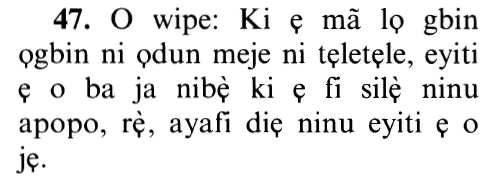12vs47
Select any filter and click on Go! to see results
قَالَ تَزْرَعُونَ سَبْعَ سِنِينَ دَأَباً فَمَا حَصَدتُّمْ فَذَرُوهُ فِي سُنبُلِهِ إِلاَّ قَلِيلاً مِّمَّا تَأْكُلُونَ
Qala tazraAAoona sabAAa sineena daaban fama hasadtum fatharoohu fee sunbulihi illa qaleelan mimma takuloona
Index Terms
Click to play
Yoruba Translation

Hausa Translation
Ya ce: "Kunã shũka, shħkara bakwai tutur, sa´an nan abin da kuka girbe, sai ku bar shi, a cikin zanganniyarsa,(1) sai kaɗan daga abin da kuke ci."
Asbabu n-Nuzuul (Occasions of Revelation)
Yusuf's Interpretation of the King's Dream
This is when Yusuf, peace be upon him, told the interpretation of the dream, without criticizing the man for forgetting his request that he had made to him. Neither did he make a precondition that he be released before explaining the meaning. Rather,
قَالَ تَزْرَعُونَ سَبْعَ سِنِينَ دَأَبًا ...
(Yusuf) said: "For seven consecutive years, you shall sow as usual)
`you will receive the usual amount of rain and fertility for seven consecutive years.'
He interpreted the cows to be years, because cows till the land that produce fruits and vegetables, which represent the green ears of corn in the dream.
He next recommended what they should do during these fertile years,
... فَمَا حَصَدتُّمْ فَذَرُوهُ فِي سُنبُلِهِ إِلاَّ قَلِيلاً مِّمَّا تَأْكُلُونَ ﴿٤٧﴾
ثُمَّ يَأْتِي مِن بَعْدِ ذَلِكَ سَبْعٌ شِدَادٌ ...
and that (the harvest) which you reap you shall leave it in the ears, (all) except a little of it which you may eat. Then will come after that, seven hard (years),
He said, `Whatever you harvest during those seven fertile years, leave it in the ears so as to preserve it better. This will help the harvest stay healthy longer, except the amount that you need to eat, which should not be substantial. Stay away from extravagance, so that you use what remains of the harvest during the seven years of drought that will follow the seven fertile years.'
This was represented by the seven lean cows that eat the seven fat cows. During the seven years of drought, they will eat from the harvest they collected during the seven fertile years, as represented by the dry ears of corn in the dream. Yusuf told them that during these years, the remaining ears will not produce anything and whatever they try to plant, will not produce any harvest, so he said,
بل قال " تزرعون سبع سنين دأبا " أي يأتيكم الخصب والمطر سبع سنين متواليات ففسر البقر بالسنين لأنها تثير الأرض التي تشتغل منها الثمرات والزروع وهن السنبلات الخضر ثم أرشدهم إلى ما يعتدونه في تلك السنين فقال " فما حصدتم فذروه في سنبله إلا قليلا مما تأكلون " أي مهما استغللتم في هذه السبع السنين الخصب فادخروه في سنبله ليكون أبقى له وأبعد عن إسراع الفساد إليه إلا المقدار الذي تأكلونه وليكن قليلا قليلا لا تسرفوا فيه لتنتفعوا في السبع الشداد وهن السبع السنين المحل التي تعقب هذه السبع المتواليات وهن البقرات العجاف اللاتي تأكل السمان لأن سني الجدب يؤكل فيها ما جمعوه في سني الخصب وهن السنبلات اليابسات وأخبرهم أنهن لا ينبتن شيئا وما بذروه فلا يرجعون منه إلى شيء .
"قال تزرعون" أي ازرعوا "سبع سنين دأبا" متتابعة وهي تأويل السبع السمان "فما حصدتم فذروه" أي اتركوه "في سنبله" لئلا يفسد "إلا قليلا مما تأكلون" فادرسوه
" قال تزرعون " لما أعلمه بالرؤيا جعل يفسرها له , فقال : السبع من البقرات السمان والسنبلات الخضر سبع سنين مخصبات ; وأما البقرات العجاف والسنبلات اليابسات فسبع سنين مجدبات ; فذلك قوله : " تزرعون سبع سنين دأبا " أي متوالية متتابعة ; وهو مصدر على غير المصدر , لأن معنى " تزرعون " تدأبون كعادتكم في الزراعة سبع سنين . وقيل : هو حال ; أي دائبين . وقيل : صفة لسبع سنين , أي دائبة . وحكى أبو حاتم عن يعقوب " دأبا " بتحريك الهمزة , وكذا روى حفص عن عاصم , وهما لغتان , وفيه قولان , قول أبي حاتم : إنه من دئب . قال النحاس : ولا يعرف أهل اللغة إلا دأب . والقول الآخر - إنه حرك لأن فيه حرفا من حروف الحلق ; قاله الفراء , قال : وكذلك كل حرف فتح أوله وسكن ثانية فتثقيله جائز إذا كان ثانيه همزة , أو هاء , أو عينا , أو غينا , أو حاء , أو خاء ; وأصله العادة ; قال : كدأبك من أم الحويرث قبلها وقد مضى في " آل عمران " القول فيه .
I'raab - grammatical analysis of the Qur'an
«قالَ» ماض وفاعله مستتر والجملة مستأنفة.
«تَزْرَعُونَ» مضارع مرفوع بثبوت النون والجملة مقول القول.
«سَبْعَ» ظرف زمان متعلق بتزرعون.
«سِنِينَ» مضاف إليه مجرور بالياء لأنه ملحق بجمع المذكر السالم.
«دَأَباً» حال.
«فَما» الفاء استئنافية وما اسم شرط جازم في محل نصب مفعول به مقدم.
«حَصَدْتُمْ» ماض وفاعله والميم علامة جمع الذكور وهو في محل جزم فعل الشرط والجملة ابتدائية لا محل لها.
«فَذَرُوهُ» الفاء رابطة للجواب وأمر مبني على حذف النون والواو فاعل والهاء مفعوله والجملة في محل جزم جواب الشرط.
«فِي سُنْبُلِهِ» متعلقان فذروه والهاء مضاف إليه.
«إِلَّا» أداة استثناء.
«قَلِيلًا» مستثنى بإلا منصوب.
«مِمَّا» من حرف جر وما موصولية في محل جر ومتعلقان بمحذوف صفة لقليلا.
«تَأْكُلُونَ» مضارع مرفوع بثبوت النون والواو فاعل والجملة صلة.
